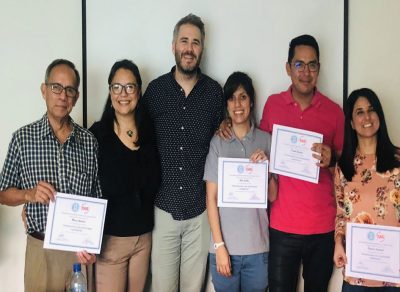Q&A with Dirk Davis, PhD Candidate in Health Behavior

Dirk Davis (third from the left) with Colectivo Amigos contra el SIDA (CAS) research team at a qualitative research workshop in Guatemala City in October, 2019.
Will you tell us more about your global health work?
My work focuses on global LGBTQ health research and more specifically, the intersections of HIV, mental health, and violence. I primarily work in Central America and the Spanish-speaking Caribbean, with most of my experience being in Guatemala, where I lived and worked for nearly five years before coming to Gillings for grad school. While the field of global health has a long history, LGBTQ health is a relatively new field (the NIH started recognizing sexual and gender minorities as health disparity populations in 2016), but one that is growing rapidly. I approach my global health work with an LGBTQ health lens – one that attempts to look holistically at the health of sexual and gender minorities and how the world around them shapes their overall wellbeing.
What do you consider the goals and responsibilities of global health?
I believe that the primary goal of global health is to ensure equity in health for every individual around the world. As a global health researcher, I believe it is my responsibility to not only acknowledge the colonial past of global health, but also to actively work towards decolonizing my research and the relationships that I have and continue to build. For example, when discussing experiences of violence among LGBTQ communities in Central America, it’s important for me to give context to my audience by explaining how US government interventions in Central America over the past 200 years have directly led to much of the violence and political instability that we see today. It’s also imperative that the work we do is not only seen as needed, but is wanted by the communities with which we’re working. For me, this has meant investing time and resources into building lasting relationships with individuals and community organizations over years.
What has been your most formative experience at Gillings?
As part of my MPH practicum in 2015, I planned to spend two months in Guatemala conducting formative research among gay and bisexual men and transgender women living with HIV for a large intervention to decentralize HIV care. However, due to some delays in the timeline and requests from the funder, instead of collecting qualitative data as expected, I spent my summer working with the research team and CDC Central America office preparing for site activation by writing intervention manuals, visiting clinics and preparing clinicians for the study. Although this was not at all what I had planned for, it was a really great opportunity learning about what all goes into a research study (including the administrative pieces, which you don’t learn about in a class). And traveling around Guatemala visiting clinics was also a really great opportunity to get to know the research team well – we had a lot of fun! It was also my first introduction to working in a research context in Guatemala; my previous experience in the country was much more focused on community work in rural settings. It was just another reminder that being flexible and able to go with the flow is an important quality to have while working in global health.
What are the next steps in your global health career?
I’m really excited to be defending my dissertation on November 6th from 9:00-10:00am where I’ll be presenting my work exploring health navigation as an intervention strategy to improve mental health among gay, bisexual and other men who have sex with men living with HIV in Guatemala (email Dirk if you’re interested in attending). In January, I’ll be starting an NIH Fogarty International Center fellowship with the University of California Global Health Institute. It’s a unique position that will allow me to continue building research collaborations in Guatemala with the Universidad del Valle de Guatemala and LGBTQ community-based organizations, and in the US within the University of California system. As part of the fellowship, I’ll also be the principal investigator of a study exploring how violence affects mental health and HIV-related behaviors among Indigenous gay and bisexual men in Guatemala (nearly half of Guatemalans identify as Indigenous). So this fellowship is giving me the opportunity to combine my work and experience with Indigenous rural communities from before graduate school and my LGBTQ health research experience that I’ve gained in the MPH and PhD programs at Gillings. I’m hopeful that this work will also lay the foundation for writing an NIH Career Development Award proposal that focuses on improving mental health among Indigenous sexual minorities in Guatemala.
If you could travel back in time, what would you travel back in time to see?
One of the pandemic hobbies that I’ve picked up this year is restoring old pieces of furniture (way more fun than writing a dissertation). If I could travel back in time, I’d travel back to spend more time with my grandfather, who was amazing at woodworking and restoring furniture, so that he could teach me his ways.
